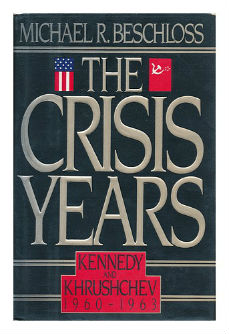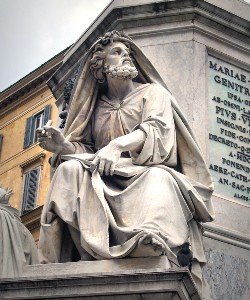Freedom From Fear…for Real
By Neil Earle
 World outlook is cloudy but we've been through worse.
World outlook is cloudy but we've been through worse.It’s now official. According to polls most Americans – the most optimistic people on earth – now feel pessimistic about the future.
COVID-19, public shootings tinged with lone wolf terror tactics are one reason, especially when hyped by the all-pervasive mass media even though only 16% “trust” TV news. Travel is a worry yet we are still safer on an airplane than in our own showers. The fall of median income is another acute worry for those heading for retirement. U.S. income peaked in 1999 and has declined ever since even after reverses made from 2016-2019.
Worries and fears; fears and worries.
I do not consider myself “old” yet I sometimes share with my congregations memories of what historian Michael Beschloss has called the Crisis Years, roughly 1957-63 when everything from Sputnik, to the Berlin Wall, to the Cuban Missile crisis seemed to threaten us with those “dark towers of destruction” President Kennedy warned about in 1961.
Winning Words
By the time the Russians flattened Czechoslovakia in 1968 I had found much help for alleviating these worst fears. By then I was an avid student of Scripture and one text stood out for me. It was found in 2 Timothy 1:6-7, St. Paul’s last writing to his somewhat sickly and timid young assistant Timothy. Here it is:
“For God has not given us a spirit of fear but of power and of love and of a sound mind.”
 Rome's Mamertime Prison where St. Paul may have written his most inspiring letters.
Rome's Mamertime Prison where St. Paul may have written his most inspiring letters.
Wise words from a man like Paul, a prisoner potentially facing execution. He wrote this possibly during his last arrest in Rome in the mid-60s AD. The Mamertime Prison was not some plush office suite with air conditioning, hot and cold running water and computers whirring and clicking and staff bringing coffee. In reading the Bible, context is everything.
Let’s focus a little more on our key text.
Paul’s word “power” is the Greek word “dunamis” from which we get “dynamic” and “dynamite.” That’s the kind of power we can use on the way to the doctor’s office or a hospital visit or seeing a sick friend or when called into the bosses’ or principal’s office.
“Love” is the ace Biblical virtue of course and here it means the supernatural ability to believe, hope and endure all things. Paul has already mentioned this in 1 Corinthians 13. Psychologists and counselors know that once we rise above hate and resentment it is then that we are unburdened to go forward with our life’s responsibilities with confidence and hope.
The “sound mind” is variously translated self-control, self-possession or “a disciplined mind.” It means a clear understanding about what is going on in our lives, a sound judgment to face the many hurdles that come at us in this complicated world, a world almost dominated it seems by unsettling reports, free-floating “news” 24 hours a day that makes us nervous and overwhelmed and distracted by fears and concerns people are facing a world away. Even our parents never had to face this airborne anxiety.
But power and love and sound-mindedness seem to be just what we need. These are fruits of what Paul called elsewhere “stirring up the spirit.”
Now how do we do that?
 John Stott
John StottThe Basic Disciplines
Most Christians know. It is through the spiritual disciplines of prayer, saturating our minds with God’s promises in the Bible, assembling with fellow Christians for worship and Bible Study and by involving ourselves in good Christian works such as homeless shelters or food banks or when the chance arises on our own block.
Other Biblical promises harmonize here. One is a command as well as a promise: “Be anxious for nothing,” reads the New King James Version of Philippians 4:6-7, “but in everything by prayer and supplication – with thanksgiving – let your requests be made known to God.”
Disc jockeys often take in “requests” from their listeners but here God opens his heart to us and says “let me hear your requests.” “Petitions” it says in another version. The result will be what we all need: the very peace of God being infused into our minds through the miracle of the Holy Spirit. “The peace that passes all understanding” as the King James Bible so nobly phrases it.
In preparing to face the year with confidence I have been much inspired by the way the great teacher and pastor John Stott analyzed another “power-packed” verse of Scripture, this time in the book of Ephesians. Even on a surface level Ephesians 3:20 sizzles with hope and optimism:
“Now to him who is able to do exceedingly abundantly above all that we ask or think, according to the power that works in us, to him be glory in the church throughout all ages, world without end. Amen.”
What Stott does in his Ephesians Commentary is to analyze separately seven vital truths relating to godly deliverance locked up in that one potent little verse.
1. First, writes Stott, God is able to DO. This is taught in both Old and New Testaments – the God of Israel neither slumbers nor sleeps (Psalm 127). He is always on the job.
2. He is able to do what we ASK. God’s delight is in the prayer of the righteous and he answers prayer according to his perfect will. If our prayers are in line with his will – that gives us confidence going forward.
3. He is able to do what we THINK. He reads our minds and hearts and Isaiah says he is able to answer requests before we even ask (Isaiah 65:24).
4. He is able to do ALL that we ask or think for he is the supreme power in the universe. In times of fear and worry we need to think of what Paul calls “the riches of his glory” and the many many case histories of where God has intervened for his people who call out to him – from David’s panicky and multitudinous cries for help in the Psalms to the early church beseeching God to send imprisoned St. Peter back to them (Acts 12).
 Prophet Isaiah statue in Rome.
Prophet Isaiah statue in Rome.5. But it doesn’t stop there. Paul promises God is able to do MORE THAN all that. What an exhilarating thought! The Greek for MORE here is HYPER and rather than focusing on our own worries that make us a bit hyper – present writer included – let’s ask God for more of what he is easily able to give us, the power and wisdom we need to get through the dark patches of life.
6. Now it gets really interesting. St. Paul not only says God can do all the above and more but he says he is able to do MORE ABUNDANTLY than all we ask or think. This begins to take us into the spiritual stratosphere! God not only delivers but he leaves a blessing behind for seeking him, said the prophet Joel (Joel 2:14). This happened in the case of good King Jehoshaphat of Judah who faced three hostile armies coming at him. With his back to the wall he cried out, trusted God and reaped the spoil from enemies that turned greedy and destroyed themselves (2 Chronicles 20).
7. At such times we can only say “Wow, what a Great God we serve.” But it doesn’t even stop there. Not only is he able to do more abundantly he is able to do EXCEEDING ABUNDANTLY above all that. “He is a God of superabundance,” writes Stott. I love the ending of the Book of Job where the patriarch, after all his scorching trials, is doubly endowed by God. “Indeed the Lord gave Job twice as much as he had before [and] blessed the latter days of Job more than his beginning” (Job 42:10-12). Pastors say it all the time – “You can’t out-give God.”
Let’s conclude with another sparkling case history.
 Famous Taylor Prism in London documents Hezekiah's successful encounter with the Assyrians.
Famous Taylor Prism in London documents Hezekiah's successful encounter with the Assyrians.Death Sentence Repealed
In Isaiah 38 the prophet reports on what happened when King Hezekiah had become stricken with a deathly illness. He had been a good king overall but possessed some inconsistencies in his character that the Second Book of Kings records. Isaiah is told to tell Hezekiah he will die.
My, oh my. What a slap. We all have sicknesses and ailments it seems but what can be worse than God’s servants showing up – not to pray for you – but to deliver your death sentence.
But Hezekiah had tasted God’s mercy once before and it says simply he “turned his face to the wall and prayed…and wept bitterly” (Isaiah 38:2-3).
That prayer got through. The result? Isaiah is told by the Spirit of God to march right back to Hezekiah’s sick-room and tell him: “Thus says the Lord, I have heard your prayers, I have seen your tears, and I will add to your days fifteen years.”
What an amazing about-face, one that saved Hezekiah’s life. His earnest prayer fitted God’s sovereign will and Hezekiah was not only given 15 more years, he saw with his eyes the deliverance of his capital city Jerusalem from the invincible Assyrians camped nearby (Isaiah 38:6). This is God doing exceeding abundantly above all Hezekiah might have expected. And Hezekiah immediately practiced another spiritual discipline: thanksgiving!
The remainder of Isaiah 38 is his poem of praise and its words speak to anyone thinking they have a hopeless life-taking disease. “I said, in the prime of my life…I am deprived of the remainder of my years” (verse 10). That’s exactly what we think when we receive a negative diagnosis. We panic and say, “It’s all over.” Hezekiah said he thought that God had made an end of him, cut him off like a weaver snipping his thread. The poor king admits he mourned like a dove – a plaintive, touching, despairing sobbing. He saw no way out: “I shall walk…in the bitterness of my soul,” thought the king on his deathbed (verse 15).
The Turning Point
But…just like a good English sonnet, there comes a major change in verse 16, a stunning turn. “You will restore me and make me live…you have cast all my sins behind my back.” Sin doesn’t always lead to sickness but even if it had Hezekiah rejoices in the spiritual deliverance that swept over his body and spirit. “Death cannot praise you,” exults the young king to his God. “Those who go down into the pit cannot hope for your truth, the living, the living man shall praise you, as I do this day.”
The king promises he will also go one better and tell the next generation of God’s abundant deliverance from a death-dealing illness (v. 18). Witnessing to God’s power in some form or other is a good thing to do after a deliverance, unlike the nine lepers whom Jesus healed who gave no thanks back.
Hezekiah – What a story! What a deliverance! What a hope!
These are the accounts that allow us to dare to hope that we can face the fears abroad in the world. Not only face them but sing with the hymn writer: “It is well, it is well with my soul.”